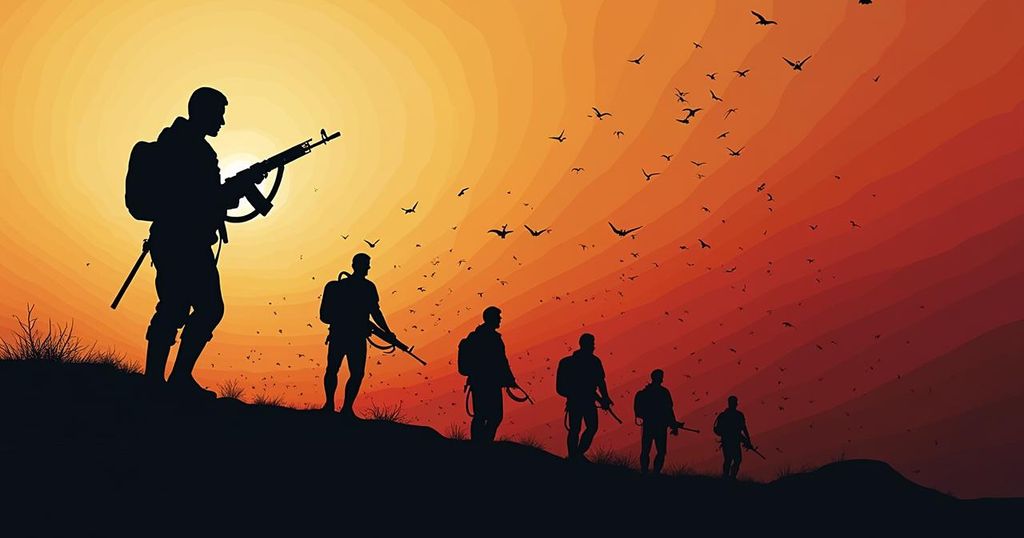Israel has intensified military operations against Hezbollah, resulting in the reported death of its leader, Hasan Nasrallah, and significant operational setbacks for the group. This campaign represents a broader strategy against Iranian influence in the Middle East, raising questions about the implications for Lebanon and the potential for increased regional instability. The international community is urging restraint amidst these developments, yet tensions remain heightened.
In recent developments, Israel has launched a comprehensive military campaign against Hezbollah, the Iranian-backed militant group based in Lebanon, executing a strategy characterized by a series of lethal strikes that have resulted in significant casualties and the near eradication of Hezbollah’s leadership. This includes a noteworthy airstrike that reportedly claimed the life of Hasan Nasrallah, Hezbollah’s leader, heralding a pronounced shift in the strategic landscape of the region. Israeli Defense Minister Yoav Gallant articulated the intended message of these military operations, stating that any party contemplating aggression towards Israel will face severe repercussions. Following the airstrike, operations intensified, targeting not only Hezbollah but also Hamas in Gaza and Iranian-aligned forces in Yemen, thus encompassing a broader spectrum of the influence exercised by Iran throughout the Middle East. Hezbollah’s capacity to respond is fundamentally compromised, with estimates revealing the group has accumulated an arsenal of approximately 150,000 rockets which, as experts suggest, may be rendered ineffective due to the extensive operational damage it has sustained. The consequences of this military campaign reverberate beyond immediate tactical successes; an analogy has been drawn to the aftermath of the 1967 war, which infamously destabilized Egypt under President Nasser. Observers note that Nasrallah’s rhetoric surrounding a united ‘axis of resistance’ has been undermined by Israel’s decisive actions, which have exposed vulnerabilities within the Iranian-sponsored coalition. Amidst these developments, history serves as a reminder that military victories may not translate into enduring security. Analysts indicate Hezbollah faces a dilemma: failure to retaliate could further erode its standing and legitimacy among its supporters, potentially igniting a new wave of conflict within Lebanon. Iran’s strategic position is also under significant strain, compelled to reassess its military posture in the wake of successive blows to its proxy networks. Scholars emphasize that while Iran may seek to maintain its foothold in Lebanon, the implications of Hezbollah’s destabilization could lead to civil unrest and conflict within the nation itself. The situation remains precarious, with lingering questions regarding the broader implications of Israel’s military actions and Iran’s potential responses, which could escalate the ongoing tensions in the region significantly. The international community, including U.S. leadership, is advocating for restraint; however, the trajectory of events suggests an already volatile narrative may be irreversibly altered.
The current situation stems from a complex geopolitical conflict involving Israel and an array of Iranian-backed groups across the Middle East, particularly Hezbollah in Lebanon. Historically, Hezbollah has posed a significant threat to Israeli security, marked by multiple confrontations. Israel’s strategic response has seen an intensification of military operations aimed at disrupting the capabilities of these groups, in light of growing Iranian influence and activities in the region. This military campaign has directly targeted the organizational structure of Hezbollah, culminating in the assassination of its leader and significant operational losses.
In summary, Israel’s aggressive military actions against Hezbollah represent a critical juncture in the conflict dynamics of the Middle East, highlighting the fragility of the Iranian-led coalition and the precariousness of regional peace. The destabilization of key militant factions raises questions about the future of Lebanon, the potential for civil conflict, and the rebalancing of power among Iranian proxies. While Israel has achieved immediate tactical victories, the long-term implications of these actions pose significant risks of escalating violence and instability in the region as a whole.
Original Source: www.washingtonpost.com






